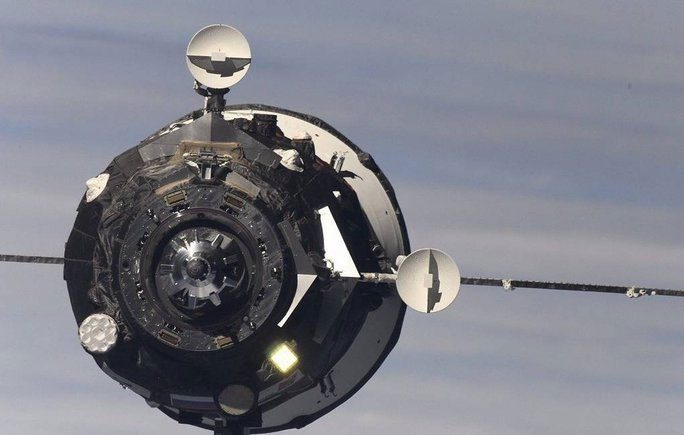The Progress MS-21 Cargo Spacecraft, the second Russian spacecraft to suffer damage in recent months, has been safely deorbited and returned to Earth.
According to a statement from the Russian space agency Roscosmos on February 19, “Progress MS-21 left its orbit today, entered the atmosphere, and fell. The parts that did not burn up in its structure fell into an isolated area of the Pacific Ocean at 6:57 AM Moscow time.”
This time corresponds to 10:57 AM on February 19, Vietnam time.

Progress MS-21 Spacecraft.
Earlier, on February 11, the Progress MS-21 spacecraft experienced a pressure drop incident, identified as a coolant leak. The spacecraft was isolated from the International Space Station (ISS) and was separated from the station on February 18.
Initially, experts planned to detach the spacecraft from the ISS on February 17, but the plan was postponed to allow specialists to switch it to remote operation mode and photograph the damaged areas of the vessel. Roscosmos CEO Yuri Borisov stated on February 13 that an emergency commission had been established to investigate the cause.
Progress MS-21 is a cargo spacecraft operated by Roscosmos, tasked with supplying the ISS. This is the second Russian spacecraft to encounter a coolant leak in recent months.
The previous incident occurred in mid-December 2022 with the Soyuz MS-22, which carried three astronauts from Roscosmos and NASA to the ISS and also faced a similar issue, concluded by both agencies to be caused by a small meteorite impact. Russia will bring these astronauts back to Earth with another Soyuz spacecraft after they complete their mission at the ISS.
NASA’s $1.5 Billion Spacecraft Suddenly Malfunctions
The U.S. space agency reported that an incident occurred with the Parker Solar Probe over the past weekend, and they are currently working on a fix by uploading a software patch for the spacecraft’s EPI-Hi instrument. The upload process began on February 17, and the instrument will be reactivated soon after completion.
NASA did not specify exactly when Parker would return to normal operation, only stating that the EPI-Hi instrument would need to be offline for several weeks. They assured that before the spacecraft’s 15th approach to the Sun, scheduled for March 12, it will be functioning normally.
NASA also assessed that aside from this issue, the Parker Probe is still “performing well overall.”


















































